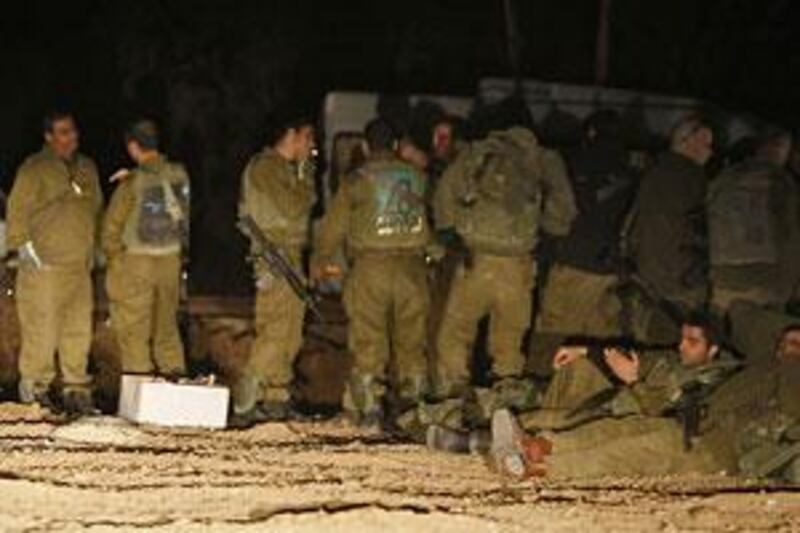GAZA // Palestinian fighters and Israeli forces engaged each other directly for the second day running yesterday, as the Israeli army probed deeper into the densely populated environs of Gaza City. The Israeli army is still holding off from engaging in all-out urban warfare, as Israeli political leaders appear divided over their next step in Israel's attack on the Gaza Strip.
On the ground in Gaza, medical officials said the death toll had risen above 900, with about 4,000 wounded; Gazan health professionals were warning about the long-term psychological effects of the Israeli offensive that is now in its 18th day. Yesterday Palestinian sources said at least nine Palestinians were killed in fighting, five of them civilians. Fierce fighting broke out on the eastern and southern edges of Gaza City as Israeli troops pushed further into the more heavily populated neighbourhoods.
The Israeli army said its planes carried out more than 25 strikes in Gaza. Two Palestinians were killed in one air strike in the centre of Gaza City, one of them a civilian, while Israeli planes also targeted tunnels under the Gaza-Egypt border, the military said. But Israeli forces are still holding back from a full-scale offensive into Gaza urban centres and the number of air sorties was lower than in recent days, suggesting the Israeli army has taken up a holding pattern as diplomatic efforts to secure a ceasefire develop. Those efforts have yet to produce any tangible result. The Hamas delegation in Egypt said it was consulting with its leadership in Damascus on an Egyptian-mediated ceasefire proposal. The Islamist Resistance Movement still has serious reservations about the Egyptian proposal, including on the issue of international forces, the opening of crossings into Gaza and the length of any truce. Israeli leaders also appeared divided over what Israel's next move will be. Ehud Olmert, the prime minister, wants to press ahead, but Tzipi Livni, the foreign minister, and Ehud Barak, the defence minister, are both reported as wanting to end the offensive sooner rather than later. Both are standing in February's general elections. Yesterday Ms Livni told Israel Army Radio that the Israeli offensive had now "restored Israel's deterrence", though she gave no indication of when it might end. Mr Olmert repeated that the military assault would not end until rocket fire from Gaza and arms smuggling into Gaza was halted. About 20 rockets were fired into Israel from the Strip yesterday, but caused no damage or injuries. Hamas is nearing victory in its war against Israel, Ismail Haniyeh, the head of the movement's government in Gaza, said last night. "We are approaching victory," he said in a televised address."The blood which has flowed will not have flowed in vain as it will bring us victory, thanks be to God." According to the health ministry in Gaza, one third of the casualties of Israel's offensive have been children. In all, Bassem Nayem, the health minister, said, 42 per cent of those killed, about 400 people, were women and children. The high civilian death toll has brought stinging criticism of Israel from relief organisations and the UN. In an impassioned press conference in front of Al Shifa Hospital, the largest medical centre in the Gaza Strip, John Ging, the head of the UN Relief and Works Agency, appealed to all parties to end the violence and to the international community to intervene immediately. "In the name of humanity and all that is civilised, we need to stop this now," Mr Ging said. UNRWA schools have been converted into emergency shelters for an estimated 25,000 Gazans who have had to flee areas of fierce fighting. Two of them were struck by Israeli shells last week, killing more than 40 people. Israel said a stray shell caused one of the incidents, but rejected accusations that it was deliberately targeting civilians. In another incident, 30 members of one family were killed when an Israeli shell struck a house where 100 relatives had huddled together to stay safe. Survivors of the attack say the Israeli army had ordered the family to stay in one place together before three missiles struck the house. Israel says it is investigating the incident. At Al Shifa, one of the survivors, Saleh Samouni, 31, was still recovering from his wounds. He lost his parents, his brother and one child among his close relatives. But on Sunday, he at least had some good news. Medics had gained access to the Samouni house on Friday. Mr Samouni's remaining son, Omar, was brought back alive. "In spite of all I went through, at least Omar survived. When I heard the news I jumped out of bed, in spite of my injuries." Healthcare professionals in Gaza say the psychological effect on ordinary people caught up in the fighting with nowhere to run is hard to overestimate. "Post-traumatic stress symptoms usually develop very quickly after the trauma. But in Gaza the trauma is continuous," said Eyad Sarraj, a Gaza psychiatrist. "There are layers upon layers of trauma here." The most at-risk group is children, who have not yet developed coping mechanisms, Dr Sarraj said. "During the siege, children lost their father as a provider as unemployment and poverty grew. With this war, children lost their fathers as protector. No one here can protect anyone from anything. Everyone is defenceless." Naturally, Dr Sarraj said, children will look for a replacement. "The replacement is a figure of power. The powerful figures today are in Hamas or Islamic Jihad or maybe more extreme ones. Violence begets violence."
okarmi@thenational.ae
Omar Karmi reported from Ramallah. Safwat Kahlout is in Gaza City.





